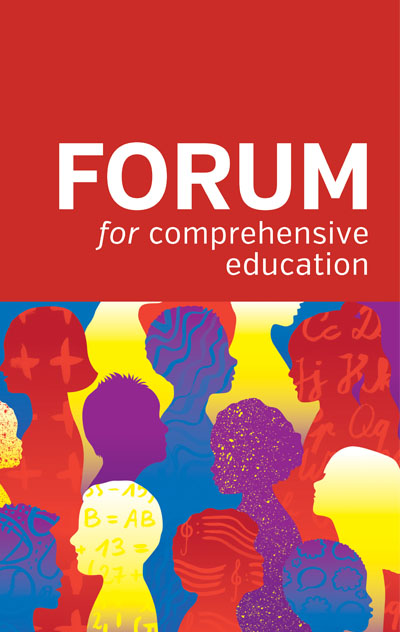
Editorial
FORUM - Print ISSN 1474-7685 - Online ISSN 2047-7171
Volume 43 Number 1 (2001)
Editorial
Annabelle Dixon pages 1‑1
DOI: 10.2304/forum.2001.43.1.1
Abstract
Cast your mind back - or in any direction, come to that: can you recall the last occasion on which you heard somebody defend with fervour the splitting up of the primary curriculum into chunks of unrelated 'subjects'; anyone speak from the heart on the desirability of depositing children into ability groups from which they may rarely escape; defend with genuine feeling the practice of league tables? Ever listened to someone justify such practices with passion on the grounds that they might make for a fairer society in which all children are given an equal chance to develop their own capabilities, and which will eventually bring about a more comprehensive, to say nothing of more comprehensible education?
The nearest to an emotional response that could be deemed passionate in relation to such initiatives might just be the extra gleam in the metallic eye of bureaucrats or politicians who have sensed opportunities for even further control; people who dismiss anything spoken about with feeling as a tiresome and juvenile element in debates that should be governed by what appears to be reason and rationality - in other words they take the view that one cannot credibly defend a position on any other grounds.
How fortunate then that we can point to those who have combined both passion and logic all their lives and been able to prove that not only can these be exemplified at a personal level but were able to use them to great effect in those arguments they defended so vigorously. Caroline Benn, whose life is celebrated in this issue by Clyde Chittty and Brian Simon, was one such outstanding example.
Ironically, many of these self-same bureaucrats and politicians owe much, as indeed we all do, to those whose reasoned arguments and passion to overcome what they saw as injustices, led to many of the great social and public-health improvements we now take for granted. These pioneers were also dismissed in their time, the passion they attached to their campaigns being dismissed as equally tiresome by their contemporaries in high office.
Interestingly, the present day bureaucratisation of education itself depends on a very particular, but by its bureaucrats, a largely unacknowledged emotion, if not for its defence then for its very perpetuation. This emotion was recently recognised and publicly named by Martin McGuinness, the Northern Ireland Minister for Education, who has stated why his country will no longer be using league tables and spelled out why: an education system that is built on a foundation of fear, as indeed league tables undoubtedly are, and which themselves generate even more fear, cannot belong to a country that wishes to call itself civilised.
To cite this article
Annabelle Dixon (2001) Editorial, FORUM, 43(1), 1-1 . https://doi.org/10.2304/forum.2001.43.1.1
